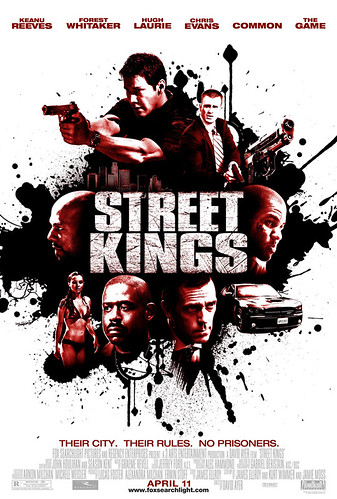
In addition to reading a ton, I try to watch a lot of movies, too. Not remarkably unique, I know. But I figured it'd be fun to irregularly review those films I do see (thanks,
NetFlix!) here on this blog. First up is
Street Kings, starring Mr. Monotone himself, Keanu Reeves.
OK, the first thing you're probably asking is "Why the hell did you even put this on your NetFlix queue?" One reason: The screenplay was written by crime fiction legend
James Ellroy. One of my personal favorites. His cinematic track record is a bit spotty, both as far as the adaptations of his novels go and his own, albeit limited forays into writing for the screen himself. Still, it was enough of a reason to check it out. I'm also a big fan of Forest Whitaker and find Keanu to be generally tolerable. He's not the best actor by any means, but I have to respect him for at least being eclectic when it comes to selecting roles.
Street Kings is the story of LA vice detective Tom Ludlow, an alcoholic widower who shoots first and fills out reports later. As his boss gets lauded and promoted, Ludlow discovers that his old partner, who is also under investigation by Internal Affairs, might be ratting him out. When his ex-partner turns up dead under mysterious circumstances, Ludlow is the target of the investigation -- but also the only person able to find the real killers.
The movie is fairly paint-by-numbers. Reeves' character is borderline cliche and he does little to add to the role that would make him stand out. Whitaker, who is usually pretty magnetic on screen, comes off flat and hammy. Every time his corrupt sergeant is on, the scenery-chewing doubles.
Not surprisingly, Reeves/Ludlow stumbles upon some details that lead him to (gasp) suspect his own people of orchestrating the death of his partner, and it inevitably points back to the LAPD. I guess I should put up a spoiler warning, but the details in the first few scenes of the film point to this so loudly it's no surprise when the plot actually meanders toward the revelation. None of the secondary characters are memorable, and if anything, some are grating, like Jay Mohr's irrelevant and smarmy corrupt detective. The highlight of the film is Hugh Laurie, who has made a name for himself on FOX's
House. I've never watched the show, so I was impressed at how magnetic he was on camera, and found myself wishing he was the lead instead of the fairly wooden Reeves.
Still, the movie rolls along at a brisk pace. While painfully predictable and unremarkable,
Street Kings falls into the "I'm just laying around the house on a Saturday morning and want to watch something" category. Not bad by any means, but not something you'd ever make a point of watching.
Ellroy peppers the script with many of the things that stand out in his early novels: corruption in the LAPD, racial tensions and a bleak, fatalistic look at modern society. Sadly, director
David Ayer chooses to focus more on the MTV aspect, with cameos from rap stars Common and The Game thrown in to make the film more palatable to the hip hop crowd, and video game-style violence that while "cool" in the moment really detracts from the plot. I found myself wondering midway through the film how Ludlow has even managed to stay alive this long. The action becomes unrealistic and distracting. The camera work is also jerky and inconsistent, as if the viewer can't decipher which scenes are supposed to be violent, so the director has to scream to let them know.
Not surprisingly, Ayer also directed
Training Day, which this movie echoes in many ways. I only realized this after checking the director's credits online, but saw many similarities while watching
Kings. The newer film, though, really only comes off as a watered down version of
Training Day, which was still riddled with flaws but had more momentum than this. If you're a fan of cops and robbers movies and don't find Reeves too brutal to watch, then there are worse ways to spend a few hours. Otherwise, I'd pass.
SuckerFlix Grade: C+
What's next: Sidney Lumet's Before The Devil Knows You're Dead








